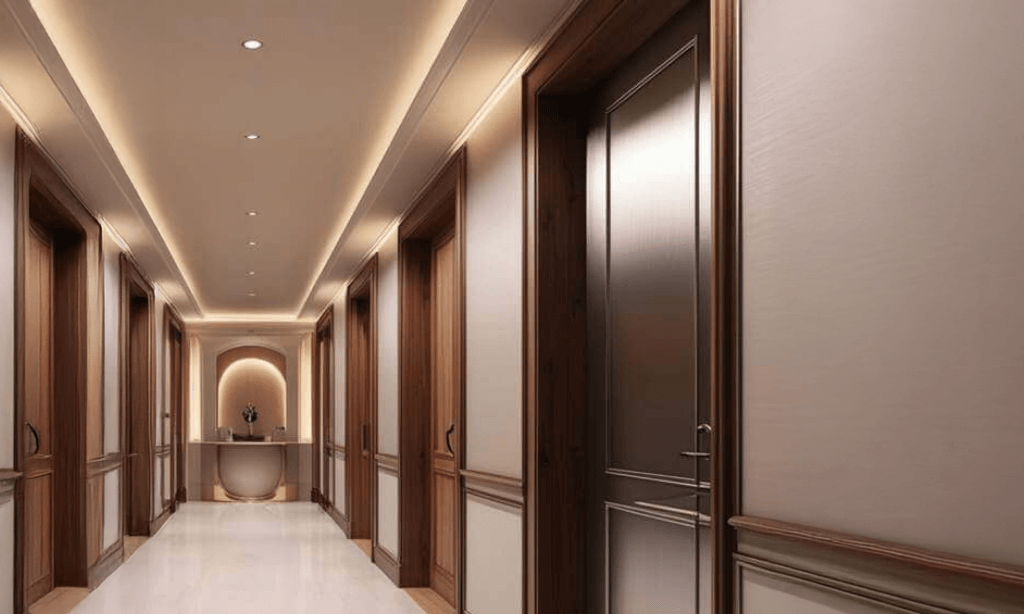
Choosing the right door thickness is a technical decision, but it makes a lasting difference in how your home feels, looks, and performs. The right measurements determine the durability, sound insulation, and the elegance of the space you are creating. In the world of design and construction, door measurement is not about fit but about how the door contributes to comfort and style.
Wesmarc Doors provides interior door thickness of 40mm and 42mm and entrance premium doors of 45mm to suit the needs of every modern space that asks for strength and elegance in perfect harmony. This is much stronger and more stable when compared with standard doors that are usually 30mm to 35mm thick. Not only do the looks improve, but also the feel of every entrance.
Understanding Why Door Thickness Matters
The residential door thickness directly affects how your doors perform over time. Thicker doors provide better insulation; both thermal and acoustic making them ideal for private and peaceful interiors. They are also more resistant to warping, bending, or cracking, which often happens with thinner doors.
By contrast, thinner doors of 35mm might only appear lighter and cheap; however, they lose out on strength, durability, and sound insulation. A residential door thickness measuring 40mm or more-offers a premium feel with smoother movement and a sturdier closure to your everyday life.
Choosing Thickness Based on Room Type
Different rooms have different uses, and the door thickness should be in accordance with its function.
Bedrooms and study Rooms: These rooms must have doors of thickness 42mm, which provides great sound insulation.
Bathrooms and Utility Rooms: Here, 40mm doors are ideal, offering moisture resistance with slim appearance.
Living Rooms and Kitchens: Go for doors with higher thickness of 42mm–45mm to prevent wear and tear due to heavy usage in these areas of a home.
Wesmarc’s adjustable frames come with enhanced door measurements to handle various requirements to suit every type of spatial and functional need.
Comparing Standard and Premium Door Thickness
Most common doors fall in the range of 30mm to 35mm, fitting easily into most of the frames but are less heavy, durable and sturdy offering lesser resistance through daily stress or climatic changes. This results in the doors creaking, warping, or possibly losing alignment over a period of time.
Wesmarc’s 40mm, 42mm, and 45mm door thickness options bring in an architectural advantage. The added depth enhances the door’s sound absorption and mechanical performance, providing more room for advanced hardware, such as heavy-duty hinges, concealed closers, and acoustic seals.
Practical Tips Before You Buy
Consider the following when defining the thickness of your door:
Room Size and Usage: The room size, and its usage helps define the thickness of the door required. A hall or kitchen may require heavier doors given the usage unlike bedrooms or study.
Compatibility of the frame: The frame and hardware must be sturdy and durable to bear the weight of heavier, thicker doors.
Climate and Humidity: Make sure to go for engineered wood doors in areas with fluctuating weather conditions, presence of moisture and humidity.
Sound privacy: Thicker doors, by nature, provide better acoustic comfort.
Design Harmony: The proportion of the door must be according to the height and style of the room to produce a sense of visual continuity.
A door is not only meant to be a style element but also functional roles to play. The thickness of doors gives it desired strength, durability, ability to withstand heavy usage and a balanced look. Wesmarc Doors integrate precision engineering with design versatility; every door thickness adds to the utility and beauty, be it in a minimalist apartment or a grand villa.
Frequently Asked Questions
1. What is the ideal interior door thickness for homes?
40mm to 42mm is an ideal thickness for interior doors in most homes given their durability, robustness, and offering great insulation.
2. Why are thicker doors better?
Higher door thickness makes them durable, stable, and are resistant to warping and cracking.
3. Are 45mm doors suitable for all rooms?
Doors with 45 mm thickness can be used everywhere but are best for areas where doors are heavily used and sound insulation may be required.
4. How do I measure door thickness correctly?
Check the door measurements with the help of a scale or measuring tape and measure from one surface of the door to the other closer to the edge.
5. Is it different to install thicker doors and matching frames?
Thicker doors may require adjustable frames and reinforced hinges to ensure perfect fit.
